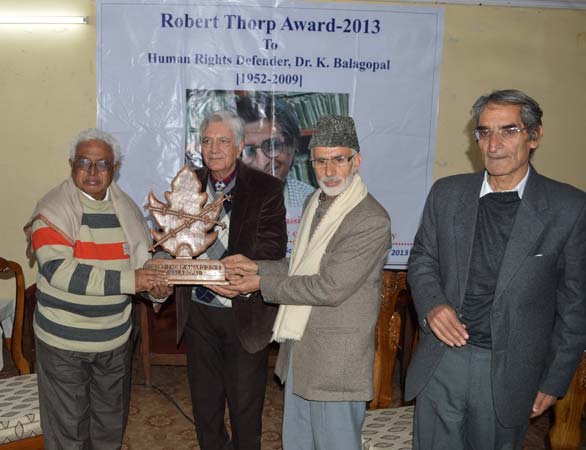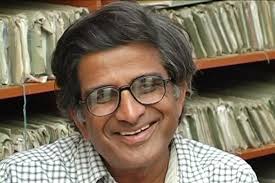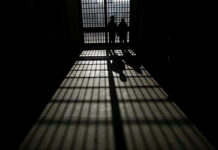Bilal Handoo
SRINAGAR

On Tuesday afternoon, civil society members gathered in Srinagar’s Lala Rukh Hotel to give away a Robert Thorp Award 2013 to a noted human rights defender of India, Dr K Balagopal posthumously.
The award was received by Prof Babaiah, one of the close associates of Dr Balagopal.
“He introduced us to Kashmir,” Prof Babaiah told audience comprised of media persons, students and activists. “He was secular and democratic person,” he said and broke down. After moments of silence, he continued with broken syllables: “He must have visited Kashmir at least 10 times, but never for a picnic. He would always stick to his job.”
The speakers who spoke on the topic: “Jammu and Kashmir and the role of Indian Civil Society” on the occasion remembered Dr K Balagopal as an “uncompromising” human rights activist, mathematician and lawyer.
“He was a staunch civil liberties activist in Andhra Pradesh,” Prof Babaiah continued, “who broken away from the Andhra Pradesh Civil Liberties Committee (APCLC), with which he was associated since its inception in ‘80’s, on the issue of violence perpetrated by the erstwhile CPI-ML Peoples War.”

After the formation of Human Rights Forum, the speakers informed that he [Dr Balagopal] expanded his activities and visited areas undergoing intense social turmoil in Jammu and Kashmir, Gujarat, West Bengal and Orissa.
“Dr Balagopal visited Kashmir in 2004 when a bomb blast in Kupwara killed Asiya Jeelani and badly injured Khurram Parvaiz,” Parvaiz Imroz, a noted human rights lawyer said.
“He lifted our confidence and resolved us to continue with the election monitoring process then.”
The award has been institutionalised after Robert Thorpe, who was born from a Muslim Kashmiri mother and British father. He was killed in 1868 after he entered into the valley to “fight for the rights” of common people.
Recorded history informs that Robert Thorpe’s father, Colonel Thorpe, a British Army officer, came to Kashmir on holidays, in 1833, and married Jani, the daughter of a landlord from Budgam district.
“Decades later, when a young Robert visited Kashmir to see his mother’s homeland, he was moved by the miserable poverty and repression the Kashmiris were living in under the Dogra regime,” Dr Altaf Hussain, a senior civil society member, said.
“He started writing against the oppressive Dogra regime in publications like ‘Friends of India’. He also held responsible the British for putting the Kashmiris under the tyrannical Dogra rule through the treaty of Amritsar.”
The Dogra rulers were disturbed by Thorpe’s criticism, said another civil society member, Abdul Majeed Zargar and deported him from the state.
“However, Thorpe managed to sneak back, but died on November 22, 1868 under ‘mysterious conditions’ at the age of 30,” he said.
It is believed that Thorpe had to pay with his life for his outspoken criticism of the Dogra autocracy.
Thorpe’s posthumously published book ‘Cashmere Misgovernment’ is perhaps the first book giving information on the taxation system, shawl industry, begar (forced unpaid labour under the Dogras), the 1846 Amritsar treaty between Maharaja Gulab Singh and the British government and other aspects of life in Kashmir.
“Dr Balagopal stood out because people around him were silent,” Gautam Navlakha, a noted human rights activist of India, said on the occasion, “but this is tragedy.”
Navlakha said that Indian Civil Society is doing its bit for the Kashmir cause, but they are facing a tough challenge in India where “nationalistic feelings have blinded people”.
“Indian Society of 90’s and that of post 2008 aren’t same,” he said. “We [Indian Civil Society] aren’t silent over the happenings in Kashmir. We have raised our voices whenever an occasion has called for it.”















